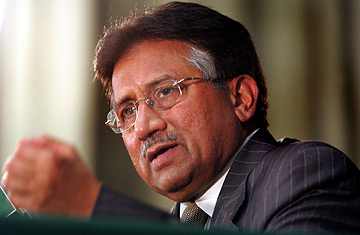
Pakistani President Pervez Musharraf
The attack on a Pakistani Air Force bus that killed eight military personnel and wounded dozens more south of Islamabad, Thursday, brought this week's death toll in suicide bombings to 15. But the spate of increasingly violent attacks on targets associated with his regime is only one of the many threats confronting the embattled President Pervez Musharraf. Challenges to his authority from the courtrooms of the capital to the rebellious mountains of the northwest have once again raised the specter of a declaration of martial law in Pakistan.
The trigger for such a decision could be a Supreme Court finding against Musharraf in legal action brought two weeks ago against his right to run for president while remaining in command of the military. The court is expected to rule within days on those cases, and also on actions challenging the legitimacy of the amnesty Musharraf offered to Benazir Bhutto on corruption charges, in order to smooth his way to a power-sharing deal with popular former prime minister, whose return to Pakistan from exile last week was greeted by a massive terror attack. And the court appears to be in no mood to submit to Musharraf, despite explicit threats from his government that ruling against him would bring martial law.
The death toll is rising along with the political temperature. A bomber had struck on Tuesday as well, this time a stone's throw away from Musharraf's residence in the garrison town of Rawalpindi, where a police post was attacked, leaving seven dead. And this week's casualties pushed beyond 700 the total number killed since the summer in violence related to extremism. At least two dozen attacks have directly targeted the military, prompting it to issue orders for officers to avoid wearing their uniforms in public or traveling in vehicles bearing military number plates. Though no group has claimed responsibility for the recent attacks, police officials have attributed them — and the attack on Bhutto's motorcade that left 141 dead — to al-Qaeda affiliated terrorists and the Pakistani Taliban currently gaining strength in the lawless tribal areas spanning the border with Afghanistan.
The tribal areas, meanwhile, are in the grip of an escalating war of insurgency and counterinsurgency, with recent clashes between militants and government forces leaving more than 100 dead. The army had been sent in to contend with the supporters of a charismatic pro-Taliban cleric bent on establishing Islamic law in the former tourist enclave of Swat, better known for its Buddha sculptures and ancient monasteries than for any kind of religious fundamentalism.
The rising death toll has many questioning whether Musharraf, deemed by Washington to be a bulwark in the fight against terrorism, is capable of restoring stability. Musharraf, who was elected by the legislature to a second term as president last month, has promised to step down as army chief before taking the oath of office on November 15. But if the court rules against him, he could simply suspend the constitution and continue to govern as head of the military. While such a move would keep Musharraf in charge, it would effectively derail plans to create a more popular, civilian-based government in Pakistan to fight extremism. And so acute has opposition to Musharraf's rule become that declaring martial law raises the danger that the combination of the tribal insurgency and related militancy in the cities, as well as anti-Musharraf agitation by the middle class (such as the recent lawyers' protests that forced Musharraf to back down from firing chief justice Iftikhar Chaudhry), will become a perfect storm of opposition that could further weaken the regime. "Martial law at this stage would be a disaster for Pakistan," says Senator Raza Rabbani. "The increase in terrorist activity in the country, the growing extremism, has a direct relationship with the lack of democracy."
The threat of martial law puts the Supreme Court in a quandary. A public fed up with years of judges ruling to please those in power has welcomed recent decisions that have reestablished the primacy of the constitution over the whims of the executive branch. But upholding the constitution in this case risks provoking its suspension by the military man who also serves as president. "It's a tricky situation," admits Rabbani. "Musharraf's disqualifications [to run for president under the constitution] are so patent that to sidestep them would be difficult for the courts. But the risks of ruling against him are also high. It is going to be very difficult for the courts to find a middle course in which the constitution is upheld, yet the apple cart is not upset."
But the Court appears in no mood to retreat from its defense of the rule of law. This week, Chief Justice Chaudhry ruled that the government's deportation of former prime minister Nawaz Sharif on September 10 was illegal, raising expectations that it may continue defying the government despite the consequences. Sharif's party, meanwhile, has announced that the former prime minister will make another attempt to return home sometime this month, adding to the mounting challenges to Musharraf's authority.
Musharraf's declining popularity has even begun to impinge on his ability to play the war-on-terror role for which Washington is depending on him. A new poll by WorldPublicOpinion.org shows that just 44% of Pakistanis are in favor of sending troops in to the tribal areas to fight al-Qaeda and the Taliban. "The Pakistani people are not enthusiastic about Musharraf," says Steven Kull, director of the polling organization. "[They] do not support his recent crackdown on fundamentalists, and are lukewarm at best about going after al-Qaeda or the Taliban in western Pakistan. It appears that a U.S. strategy that rests on Musharraf being a frontline in the war on terrorism has poor prospects." And that's if Musharraf succeeds in holding on to power in the face of a gathering storm.
